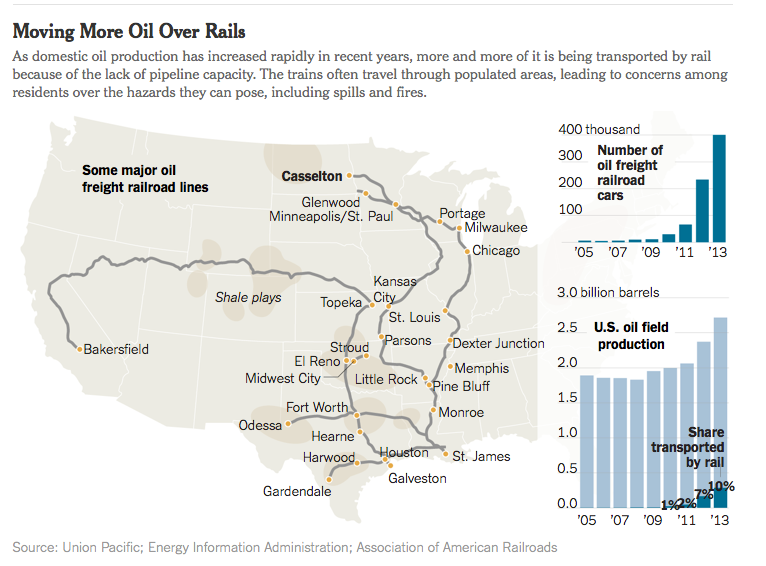Well - if you don't have a pipeline, you can ship oil by rail, right ... there is an extensive network of rail lines that can be used for distribution of Bakken oil.
How has that been working out? Not so well it turns out ... there seem to be some serious infrastructure issues, as well as design issues with the rail cars themselves (see Casselton Train Collision and Derailment for example)
For an even more dramatic example, take a look at this image from the Transportation Safety Board of Canada of the aftermath of the Lac-Mégantic derailment.
Some background: On July 6, 2013, a fire breaks out in an unmanned 74-car freight train, 72 of which were loaded with Bakken formation crude oil. Somehow the rolled downhill and derailed. At 1:15am, the town of Lac-Mégantic is rocked by a powerful series of explosions. Dozens of businesses and homes are destroyed in the blast, roughly half of the downtown area, is destroyed. Forty-seven people are killed. (If you are interested in the timeline see http://www.cbc.ca/news2/interactives/timeline-lac-megantic/)
According to the Transportation Safety Board, Canada's railways saw 143 accidents involving dangerous goods in 2013, up from 119 a year earlier. And there have been new incidents this month. On Jan. 7 a CN freight hauling crude oil derailed near Plaster Rock, New Brunswick sparking a fire that burned for several days.
According to an analysis of the most recent data from the Pipeline and Hazardous Materials Safety Administration more oil was spilled from trains in the U.S. in 2013 than in every year between 1975 and 2012 combined
(http://www.mcclatchydc.com/2014/01/20/215143/more-oil-spilled-from-trains-in.html)
Trains with 70 - 100 crude cars are a relatively recent occurrence and the tracks were not designed with this type of hazard in mind. On January 23, the U.S. National Transportation Safety Board (NTSB), in coordination with the Transportation Safety Board of Canada, issued recommendations that shipments avoid populated areas and that crude oil be added to a list of hazardous materials which require tougher routing protocols. The problem is that for Bakken oil headed to refineries in the east, alternative train routes are limited.
For example, the most direct route eastward from the Bakken region of North Dakota is through Minneapolis and St. Paul, Minnesota, then Chicago. The alternate route for Canadian Pacific (CP) trains goes north to Winnipeg, Manitoba, across Northern Ontario, southeast to Toronto and likely to Montreal before heading south to the United States. You exchange Chicago for three of Canada's largest cities.
Moving south isn't rift with routing choices either ...
 |
| From: http://www.nytimes.com/ |
The crude oil produced in the Bakken also has some unusual characteristics that make it more hazardous. Tests indicate that Bakken oil is a lot more volatile than other grades of oil, which might explain the huge explosions seen in the past few months. The oil also appears to be highly corrosive. The Federal Railroad Administration pointed to rising numbers of oil cars that showed a “form of severe corrosion” on the inside of the tanks, covers and valves. This is in addition to the fact that the NTSB issued several safety recommendations to PHMSA regarding the inadequate design and poor performance of the DOT-111 tank cars commonly used to ship crude oil.
We should, hopefully, be seeing some significant changes in the next few months to improve the safety of crude oil shipping practices in the United States and Canada.



No comments:
Post a Comment
Hi! I do read all of the comments and want to let you know that I really appreciate your stopping by and taking the time to leave a note. Work has fallen in on me and I have not had enough time to reply coherently lately so I apologize preemptively but still want to assure you that your comments are valued. I am using comment moderation to avoid using more annoying spam avoidance. Thanks for your patience.